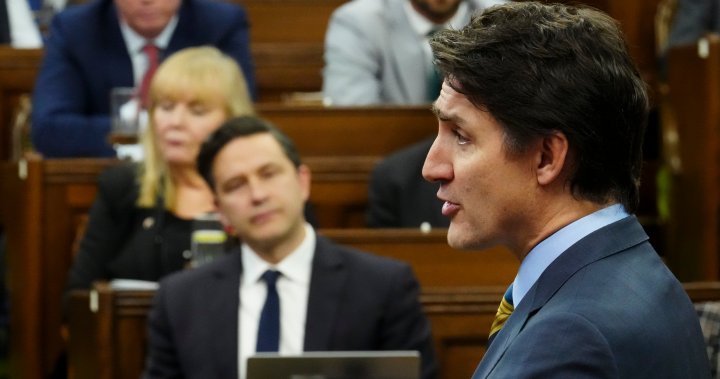Canadian MPs are set to vote on a Conservative motion aimed at toppling Prime Minister Justin Trudeau’s government, but the motion is expected to fail. Conservative Leader Pierre Poilievre tabled the motion in the House of Commons, which simply states that the House has no confidence in the Prime Minister and the Government. MPs from the four main political parties spent hours debating the motion, and it is expected to be put up for a vote soon. However, both the NDP and the Bloc Québécois have indicated that they will not support the motion. If the non-confidence motion were to pass, the government would fall, triggering a snap election. The minority Liberals need the support of at least one other party in the House of Commons to survive such votes or pass any legislation.
NDP Leader Jagmeet Singh has stated that his party will vote against the non-confidence motion, asserting that they won’t allow Poilievre to dictate their decisions. Singh highlighted the Conservatives’ history of cuts to health care and noted that Poilievre voted against important programs such as dental care for low-income Canadians and the national pharmacare program agreed upon under the Liberal-NDP deal. The NDP recently pulled out of that agreement on September 4. Meanwhile, the Bloc Québécois has expressed its willingness to give the Liberal minority government a chance for now and is prepared to negotiate on important issues. Bloc Québécois MP Alain Therrien stated in French during a House of Commons debate that there will be other opportunities to take down the government, so for now, they are willing to give the government a chance.
Although the non-confidence motion is not expected to pass, the upcoming vote serves as an important test for Trudeau and his government following the collapse of their supply-and-confidence deal with the NDP. The motion comes after a challenging summer for the Liberals, which included two major byelection losses and the NDP withdrawing support from their agreement earlier in the month. Additionally, exclusive polling from Ipsos conducted for Global News shows that support for Trudeau and his government has reached a new low. It reflects a period of uncertainty and instability for the Liberal government and highlights the challenges they are facing in maintaining the support of the House of Commons and the public.
The potential defeat of the Conservative motion and the continued support of the NDP and the Bloc Québécois for the Liberal government indicate that Trudeau’s administration is unlikely to fall at this time. The support from these parties offers a level of stability for the minority government, allowing them to continue governing and passing legislation. However, the lack of a clear majority in the House of Commons continues to pose challenges for Trudeau, requiring him to negotiate and compromise with other parties to move his agenda forward. The dynamics within parliament are fluid, and the balance of power can shift quickly, emphasizing the need for effective communication and collaboration among political parties.
As Canadian MPs prepare to vote on the Conservative motion, the focus is on the political landscape in Canada and the future of Trudeau’s government. The outcome of the vote will have important implications for the stability of the government and the country as a whole. The debate and discussions leading up to the vote highlight the diversity of perspectives and priorities among the different political parties, underscoring the challenges of governing in a minority situation. Regardless of the outcome of the vote, it is clear that the political landscape in Canada is dynamic and evolving, requiring constant attention and adaptation from all parties involved. The results of the vote will shape the future direction of the government and the policies that will impact Canadians in the coming months.


